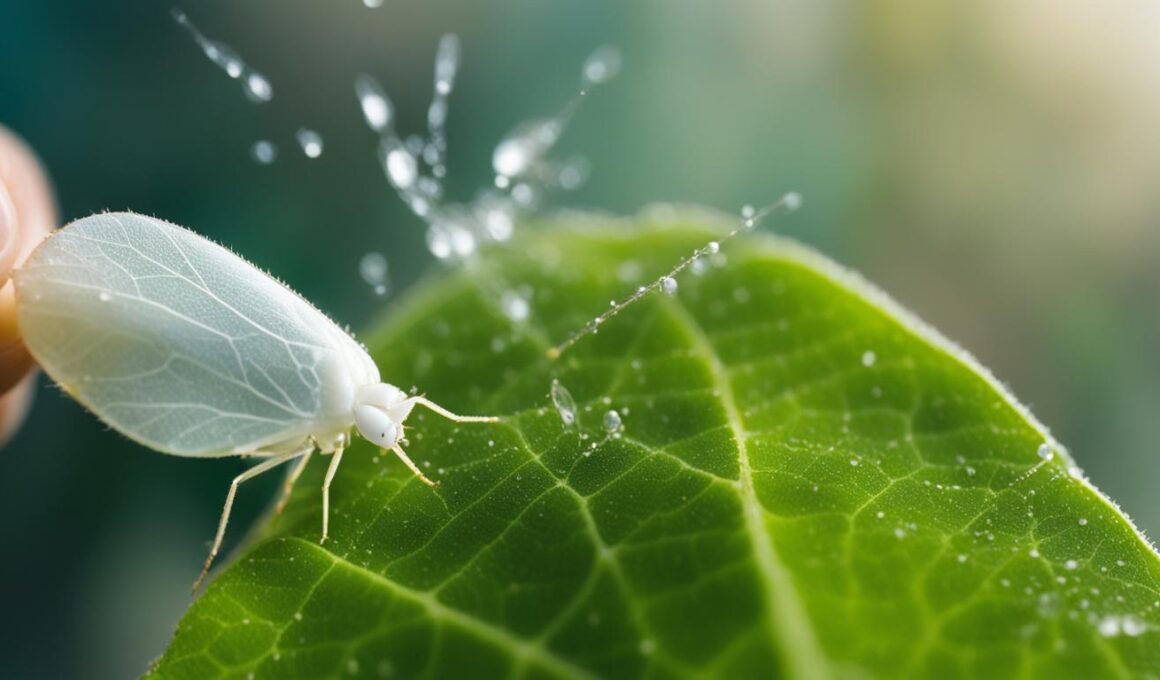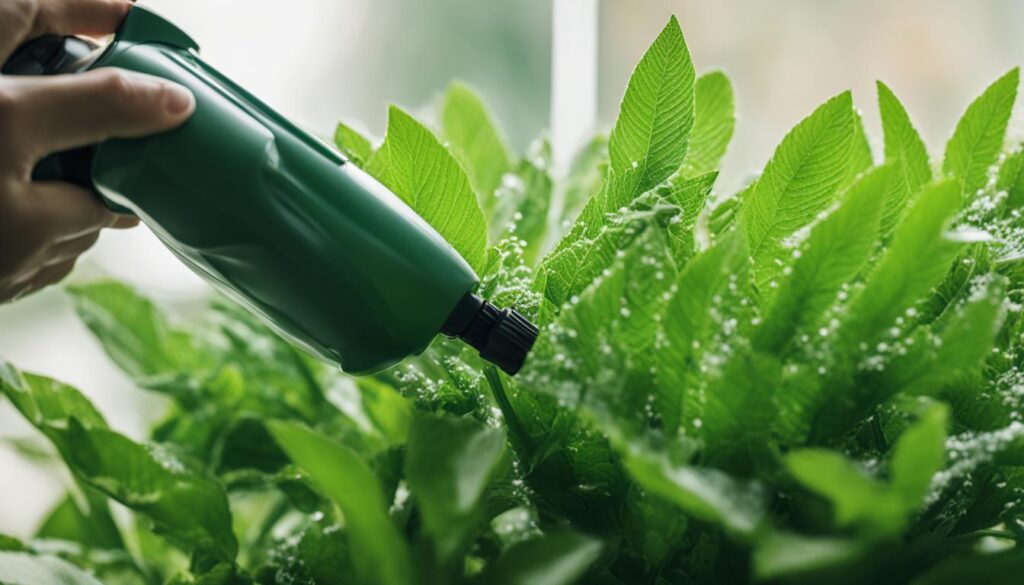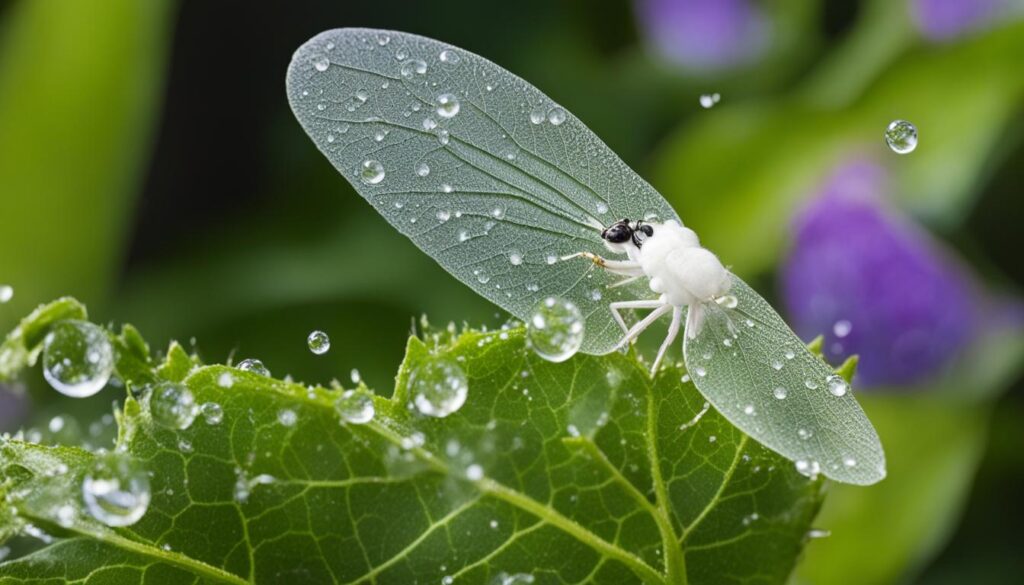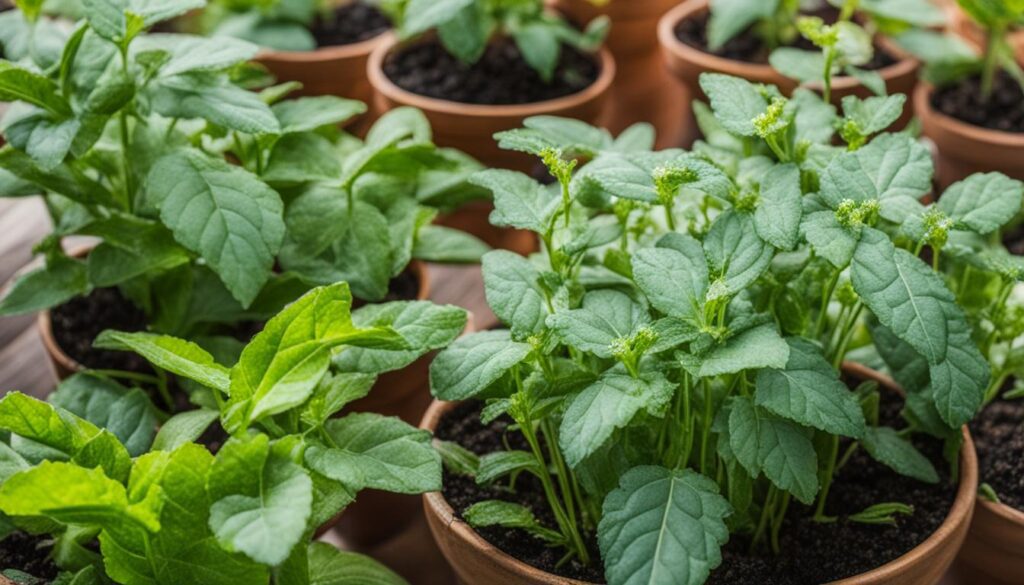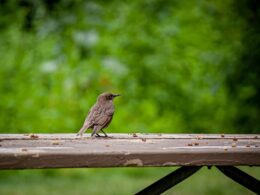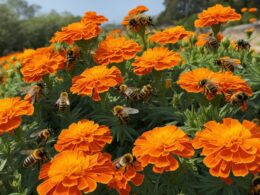Whiteflies can wreak havoc on your plants and crops, causing significant damage. If you’re dealing with a whitefly infestation, there are several natural remedies you can try at home to effectively control and eliminate these pesky pests.
One of the simplest methods to combat whiteflies is vacuuming them up using a handheld vacuum cleaner. By removing the insects in the morning when they are slower-moving, you can significantly reduce their numbers and prevent further spread. Additionally, removing infested leaves from plants can help control the population and limit the damage caused by whiteflies.
Another effective natural solution is using a soap and water spray. By mixing a tablespoon of dish soap with a gallon of water, you can create a potent solution that kills adult whiteflies. Regularly spraying the affected plants with this soapy water can eliminate newly hatched whiteflies and prevent reinfestation.
Planting certain varieties of plants can act as natural whitefly repellents. Dill, catnip, bee balm, basil, and chives are known to deter whiteflies and can be strategically placed in your garden to protect your plants. Adjusting the nitrogen levels in the soil, as well as applying mulch and fertilizer, can also increase plant resistance to whitefly infestations.
Sunlight plays a crucial role in whitefly control. Ensuring that your plants receive adequate sun exposure can repel whiteflies and discourage their presence. Encouraging bird predators, such as songbirds and hummingbirds, can also help control whitefly populations in your garden. Neem oil, a natural repellent, can be used to hinder whitefly feeding and further limit their damage.
In conclusion, implementing these natural remedies can effectively control and eliminate whitefly infestations. By vacuuming, removing infested leaves, using soap and water sprays, and employing natural repellents, you can take an integrated approach to whitefly control. Remember to monitor your plants regularly and take action at the first sign of an infestation.
Key Takeaways:
- Vacuuming whiteflies and removing infested leaves can help reduce their population.
- A solution of water and dish soap can be used to kill adult whiteflies.
- Planting dill, catnip, bee balm, basil, and chives can act as natural whitefly repellents.
- Adjusting soil nitrogen levels, using mulch, and applying fertilizer can enhance plant resistance to whiteflies.
- Ensure plants receive adequate sunlight and encourage bird predators to control whitefly populations. Neem oil can also be used as a natural repellent.
Vacuuming and Removal
When it comes to controlling whiteflies, vacuuming and removal can be effective measures to reduce their population and prevent further spread. By utilizing a handheld vacuum cleaner, you can easily suck up these tiny pests, especially in the morning when they are slower-moving. The vacuuming method not only physically removes the adult whiteflies but also helps to eliminate nymphs, larvae, and pupae.
In addition to vacuuming, another strategy is to manually remove infested leaves from the affected plants. Focus on the leaves that are heavily covered with whitefly nymphs, larvae, and pupae. By doing so, you can target the hotspots of whitefly activity and significantly reduce their numbers. Remember to dispose of the infested leaves properly to prevent the whiteflies from reinfesting other plants.
Implementing vacuuming and removal as part of your whitefly control routine can help to keep infestations in check. However, it’s important to monitor your plants regularly to catch any signs of reinfestation and take immediate action to prevent further spreading.
Table: Vacuuming and Removal
| Method | Benefits | Considerations |
|---|---|---|
| Vacuuming whiteflies | Effectively removes whiteflies from plants | Works best when whiteflies are slower-moving, such as in the morning |
| Removing infested leaves | Targets areas with high whitefly populations | Dispose of infested leaves properly to prevent reinfestation |
By combining vacuuming and removal with other natural whitefly control methods, you can create a comprehensive approach to keeping these pests at bay. This integrated strategy can help protect your plants and prevent the destructive effects of whitefly infestations.
Natural Whitefly Spray: An Effective Home Remedy
When it comes to combating whitefly infestations, a simple and cost-effective solution can be found right in your own kitchen. A soapy water spray made with dish soap and water is a highly effective natural remedy for controlling whiteflies. This easy-to-make solution targets adult whiteflies and can help eliminate these pests from your plants.
To create the soapy water spray, simply mix one tablespoon of dish soap with a gallon of water. Stir the mixture gently until the soap is fully dissolved. Then, transfer the solution to a spray bottle and apply a generous amount to the affected plants, making sure to thoroughly cover the leaves, stems, and undersides of the foliage. The soap suffocates the whiteflies, effectively killing them.
For optimal results, it’s recommended to repeat the soapy water spray application every few days, especially if you notice newly hatched whiteflies. This regular treatment will help break the life cycle of the whiteflies and prevent further infestation. Additionally, it’s important to monitor your plants closely for any signs of reinfestation and promptly take action if necessary.
“Using a soap and water spray is an excellent organic approach to control whiteflies. The soap in the solution disrupts the insects’ waxy coating, causing them to dry out and perish. This method is safe to use on most plants and is environmentally friendly.”
By incorporating a natural whitefly spray into your pest control routine, you can effectively combat whitefly infestations without the need for harsh chemicals. This eco-friendly approach not only protects your plants but also helps to maintain a healthy and thriving garden. So the next time you spot these tiny insects wreaking havoc on your plants, reach for the dish soap and water, and give those whiteflies a soapy surprise.
Table: Pros and Cons of Soapy Water Spray for Whiteflies
| Pros | Cons |
|---|---|
| Environmentally friendly | May require multiple applications |
| Cost-effective | May temporarily affect beneficial insects |
| Safe for most plants | May cause leaf discoloration on sensitive plants |
| Easy to make and apply |
| Pros | Cons |
|---|---|
| Environmentally friendly | May require multiple applications |
| Cost-effective | May temporarily affect beneficial insects |
| Safe for most plants | May cause leaf discoloration on sensitive plants |
| Easy to make and apply |
Natural Repellents and Nutrient Adjustments
When it comes to controlling whitefly infestations, natural repellents and adjustments to nutrient levels can play a significant role. Not only can certain plants act as natural whitefly repellents, but optimizing the nitrogen levels in the soil can also enhance plant resistance. Additionally, applying mulch and fertilizer can make plants less susceptible to whiteflies.
Planting specific varieties of plants known to repel whiteflies can help protect your garden. Some effective natural repellents include dill, catnip, bee balm, basil, and chives. These plants emit scents that deter whiteflies, making them less likely to infest your crops and garden.
Another important factor to consider is nutrient adjustment. Whiteflies tend to be attracted to plants with high nitrogen levels, so it’s vital to strike the right balance. By adjusting the nitrogen content in the soil, you can create an environment that is less favorable for whitefly infestations. Consult with a local gardening expert or use a soil testing kit to determine the appropriate nitrogen levels for your plants.
Table: Natural Whitefly Repellents and Nutrient Adjustments
| Plant | Attributes |
|---|---|
| Dill | Strong scent repels whiteflies |
| Catnip | Natural repellent to whiteflies |
| Bee Balm | Produces aromatic compounds that deter whiteflies |
| Basil | Natural insect repellent for whiteflies |
| Chives | Effective in repelling whiteflies |
By incorporating these natural repellents and making nutrient adjustments in your garden, you can create an environment that is less inviting to whiteflies. Remember to monitor your plants regularly and take action at the first sign of whitefly infestation to prevent further damage.
Sunlight, Bird Predators, and Neem Oil
When it comes to controlling whiteflies naturally, harnessing the power of sunlight can be highly effective. Whiteflies are repelled by direct sunlight, so ensuring that your plants receive adequate sun exposure can help deter these pests. Position your plants in areas where they can bask in the sun’s rays for several hours each day, and trim back any nearby foliage that may be casting shade on your plants.
Another natural method for controlling whiteflies is to encourage bird predators in your garden. Songbirds and hummingbirds are known to feed on whiteflies and can help keep their populations in check. To attract these feathered allies, consider setting up bird feeders, providing fresh water sources, and planting native vegetation that offers suitable nesting sites and food for birds.
Neem oil is a popular choice for organic pest control, including whiteflies. This natural oil is derived from the neem tree, and its pesticidal properties repel whiteflies and hinder their feeding. To use neem oil as a whitefly repellent, mix it with water according to the manufacturer’s instructions and spray it onto the affected plants. Be sure to cover both sides of the leaves, as whiteflies often congregate on the undersides.
By harnessing the power of sunlight, attracting bird predators, and utilizing neem oil, you can add three powerful tools to your arsenal against whiteflies. Remember to regularly monitor your plants for signs of infestation and take swift action to prevent the whiteflies from spreading.
| Sunlight for Whitefly Control | Bird Predators of Whiteflies | Neem Oil as a Whitefly Repellent |
|---|---|---|
| Whiteflies are repelled by direct sunlight | Songbirds and hummingbirds feed on whiteflies | Neem oil repels whiteflies and hinders their feeding |
| Ensure plants receive adequate sun exposure | Attract bird predators with feeders and native vegetation | Mix neem oil with water and spray onto affected plants |
| Position plants where they can receive several hours of sunlight | Provide fresh water sources for birds | Cover both sides of the leaves with neem oil spray |
Are Natural Home Remedies Effective for Combating Whitefly Larvae in the Garden?
Natural home remedies can effectively combat whitefly larvae in the garden. Neem oil, garlic spray, and insecticidal soap are all effective in controlling whiteflies without harming the plants or the environment. These methods are safe, affordable, and easy to use for gardeners looking to combat whiteflies larvae garden.
Conclusion
Implementing natural remedies is the key to effectively controlling and eliminating whitefly infestations in your garden. By following these home remedies, you can tackle whiteflies and protect your plants.
Start by using a vacuum cleaner to physically remove whiteflies from your plants. This simple and effective method can significantly reduce their numbers. Additionally, remove infested leaves to prevent further spread and minimize the population.
Another effective solution is using a mixture of water and dish soap as a spray. This natural whitefly spray can be applied regularly to target adult whiteflies and eliminate newly hatched ones.
Furthermore, consider using natural repellents such as dill, catnip, bee balm, basil, and chives, which can help protect your plants from whitefly infestations. Adjusting the nitrogen levels in the soil and applying mulch and fertilizer can also enhance your plants’ resistance to whiteflies.
Remember to monitor your plants regularly and take immediate action at the first sign of an infestation. By adopting an integrated approach to whitefly control, you can maintain a healthy garden free from these destructive pests.
FAQ
How can I control whiteflies at home?
There are several natural remedies you can try at home to control whiteflies. These include vacuuming them up, removing infested leaves, using a solution of water and dish soap, planting certain repellent plants, adjusting soil nitrogen levels, ensuring adequate sunlight, encouraging bird predators, and using neem oil.
When is the best time to vacuum whiteflies?
The best time to vacuum whiteflies is in the morning when they are slower-moving.
How often should I use the soap and water spray?
You can repeat the soap and water spray every few days to eliminate newly hatched whiteflies.
Which plants act as natural whitefly repellents?
Dill, catnip, bee balm, basil, and chives are known to act as natural whitefly repellents.
How can I adjust soil nitrogen levels to prevent whitefly infestations?
Adjusting soil nitrogen levels can be done by applying mulch and fertilizer to make plants less susceptible to whiteflies.
How can I encourage bird predators to control whitefly populations?
You can encourage bird predators, such as songbirds and hummingbirds, by providing bird feeders, bird baths, and suitable habitat in your garden.
How does neem oil help control whiteflies?
Neem oil acts as a repellent and hinders whitefly feeding, making it an effective natural remedy.





